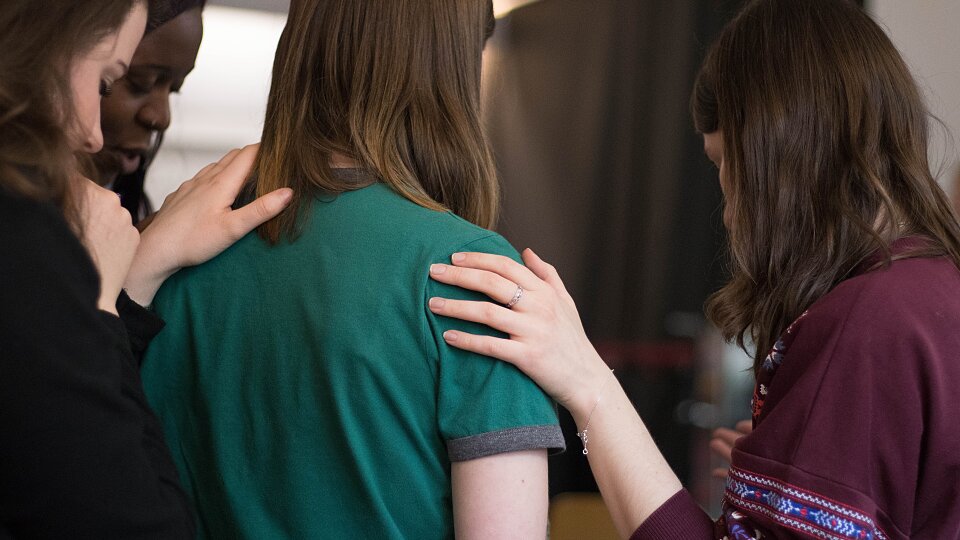Grieving a Miscarriage Part 2: For the Comforter
Between August of 2021 and February of 2022, my wife and I lost two children to miscarriages. We were devastated. Through this season of loss, we had many friends and family rally around us in attempts to comfort and console. We learned how blessed we were to have the community we have. The way they served us in this season has forever impacted the way we think about serving others who grieve. We also learned the hard way, through other well-meaning attempts, that not all “comforters” are comforting. In Part One, I offered thoughts to the mourning parents of miscarried children. In this article, Part Two, I’d like to offer some thoughts to those who might find themselves in a position to comfort mourning parents.
1. Don’t try to diagnose.
For the first time, we understood, maybe, how Job felt when his friends came with diagnoses to his situation. After our first miscarriage, a few well-meaning comforters (individually) offered, “you know? Maybe God knew this child would have complications, so He spared this baby from them…” Another comforter approached me one day after our second miscarriage to check in. He speculatively shared, “…maybe God knew you guys weren’t ready for a fourth, so He’s preventing you from having another to give you more time.”
Now, while I can understand how the first approach may seem comforting to some, it breaks down when you think of all the children who are born with complications. It’s a misunderstanding of the sovereignty of God. Both diagnoses were deflating and the second was infuriating (not to mention suspect in theology). Again, I’m certain they meant well. But diagnosing what God is doing in someone else’s suffering is a recipe for overstepping and damaging a relationship. If you are comforting someone and your statement begins with “you know?” or “maybe”, it’s most likely best to keep it to yourself. Don’t try to diagnose.
2. It’s okay to acknowledge you don’t understand and can’t relate.
We have a young worship team who I (we) love dearly. Many are married. A few of the represented families have kids. But, a large number of them aren’t quite at that season yet. When we broke the news to them, I honestly wasn’t expecting a significant amount of comfort in the form of words. To my surprise, one of the more relieving things to hear was when any of them confessed, “I don’t understand your pain and I’m not even going to try to act like I do.” Because of some of the poor attempts to comfort us, I felt like I had to walk around with walls up around myself and my wife so that I could protect us from ignorance. When I heard the confession from individuals from our team, I was disarmed and comforted because I knew they weren’t going to try to say anything profound. Sure, they didn’t understand our circumstances, but what they did understand was just as important. Their self-awareness made them effective in the way they served and comforted us.
3. You can be 100% right and 100% not helpful.
Theology is necessary in navigating suffering, sadness, and pain. Our church has been the most incredible resource for the foundation we fortunately had for our theology of suffering. Watching the way our pastor, Erik, and his wife and daughters navigated the death of their son/older brother, Kaleb, was training that God used in our family’s life to prepare us for the faith we needed in the midst of our own suffering. Again, a theological foundation for suffering is necessary.
What we actually found was not helpful, and even repulsive, was when someone who never experienced what we were going through would give their best shot at comforting by offering a theological lesson or nugget of wisdom for us to chew on. I understood the sentiment. I 100% agree with and believed most of the theology that was offered. (I say most, because some of it was trash…) BUT, in more cases than not, it wasn’t helpful. It came across ignorant and aloof. Some of the most helpful things we did hear, though, were “I’m praying for you and I’m here.” “I can’t relate, but I’m sorry for your loss. What do you need?”
In our situation, we didn’t need anyone to have the answers for what we were going through. That wasn’t helpful. We needed their presence more than anything.
4. Don’t neglect the ministry of presence.
I’ll never forget, after we found out about our second miscarriage, two of our closest friends, Hunter and Chey Christian, were waiting on us when we got home. They hugged us when we arrived. They didn’t say a word about our news. They didn’t ask questions. They were fully aware and didn’t need to say anything. We knew they were aware of our pain, and we were comfortable not being ok around them. They didn’t offer answers or even pry for conversation. They didn’t cast judgment on us for our poor hospitality, and we didn’t feel the need to entertain. At times we were silent. At other times, we were laughing. They brought a normalcy to our sadness simply by offering us the ministry of their presence.
After Megan’s second miscarriage, she had other scary complications. One of which was she experienced a TIA (mini-stroke) on the way to take my oldest son to school. She had all three boys with her. My whole world was in that car, and I was on the phone with her as she began to slur her speech. By the grace of God, she arrived safely to the school. When I knew she was safe, the floodgates opened. A mixture of a second lost child, a grieving wife, and now a frightening event that had me thinking about life without my wife and kids was more than I could stand. I sobbed. As I referenced in Part One, Matt, our executive pastor, an elder, and one who has become a mentor to me and a resident granddad to my kids, offered me the ministry of presence. I called him to tell him what happened, but all I could get out was “I’m not ok… I just need someone to know. I don’t know what we need. This is hard.” The most comforting words in that moment were, “I’m here.”
Don’t neglect the ministry of presence.
5. Pray out loud over them.
It’s incredibly comforting to know when someone is praying for you. It’s awesome to hear someone tell you “I’m praying for you”, or “I have prayed for you.” It’s another level of encouragement and comfort when someone takes time to voice a prayer over you. It nourishes the believer to hear the saints intercede on their behalf. This is an incredible reality: the same Spirit in you is the same Spirit in the mourning believer. When we pray over people in the name of Jesus and through the power of the Spirit, we join in the same prayers the Spirit is already voicing for the mourner. It’s through the saint that the one mourning might actually hear what is already being prayed. This is comforting and empowering.
A few days following our first miscarriage, our tech production director, John Hogan, prayed over me. He’s single with no kids and he has never experienced a miscarriage or navigated a grieving wife, but his prayer comforted me. Again, he had no answers and couldn’t relate. But he prayed out loud over me and it’s what I needed at that moment.
Don’t just pray in private for the suffering saint; pray in person.
As you navigate comforting any mourner, ask the Spirit to guide you and guard you. You are in a delicate and impactful position. Thank Him for the opportunity and depend on Him as you go. Pray for wisdom. Seek your own comfort from the scriptures and make yourself available. Your presence and your prayers will go further than you know.
 Brett is the Worship Pastor at The Journey Church in Lebanon, TN and the founder of Journey Worship Co. He is married to Megan and has three boys, Keaten, Griffey, and Lou.
Brett is the Worship Pastor at The Journey Church in Lebanon, TN and the founder of Journey Worship Co. He is married to Megan and has three boys, Keaten, Griffey, and Lou.
Recent Articles:
TOPICS
- Depression, Grief, Marriage, The Church


